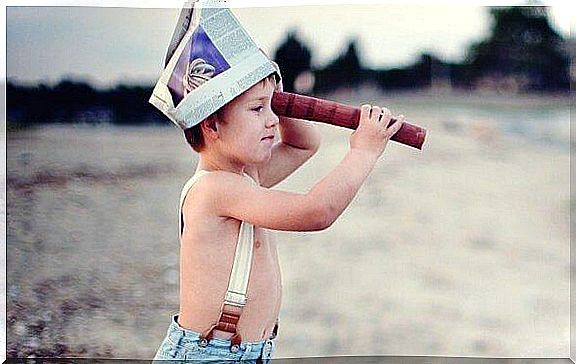7 Keys To Raising Confident And Independent Children

Raising confident and independent children is not easy. We need to know when to intervene and when to give children space. The space they need to learn life skills, those who stay with them after facing challenges and difficulties. In addition, this parenting skill requires great patience, a lot of love and wisdom to meet the needs of children.
Some time ago, an interesting book called “Raising Independent, Self-Confident Kids” was published. The child psychiatrists Wendy Moss and Donald Moses, who wrote this book, reflect on parenting models that many mothers and fathers have already embraced.
We have reached a point where one of our priorities is to try to solve every problem our children face. Sometimes we even try to anticipate these problems, trying to make sure their lives are easy, peaceful and rewarding. In this way, we surround them with almost magical serenity. On top of that, this calms us down when we know everything is in order.
All of this is undoubtedly understandable, and in most cases even expected. But some parents still take this to extremes. Pampering a child every day and in every circumstance prevents them from acquiring a much-needed skill. The skill they need to be able to act independently. This ability is commonly known as executive activity.
Child psychiatrists Wendy Moss and Donald Moses define executive action as: skills in which a person learns to be responsible for their own world, to organize and manage their own affairs, to learn from their mistakes, and to develop a sense of self-resilience . Let’s look at strategies we can use to raise confident and independent children.

1. Raising independent children – knowing when to be involved and when to guide a child from afar
Raising a child is like dancing. Sometimes we have to hug and hold them in our hands, and then we have to set them free. We need to understand that even when we let go of our dance couple so that he can perform his own steps and movements in complete freedom, he is still present, observing and guiding from a distance.
Knowing when to act and when to distance ourselves from our children is not easy. This requires, firstly, the application of the basic rules of cohabitation. We are now talking about the body of cohabitation, where each member of the house has their own responsibilities. If these members accept and perform these responsibilities properly, they can gain certain rights in the economy. In this way, these family-centered agreements help the child grow up in a safe and happy environment. Thus, they always know what is expected of them.
2. Trust
To raise independent children, we need to offer them confidence. Trust in us parents or teachers, and trust in themselves. In this way, the child grows up in an environment where he or she is constantly supported and where love and attention are always present. He has no fears or obstacles when he has to communicate his problems and needs. He relies more on his abilities to do almost anything.
3. Learning healthy choices
What do we mean by healthy choices? Healthy and fulfilling choices are the ones that allow a child to learn. They open the door for the child to accept responsibility for their own actions. The child understands that his actions have consequences. She realizes that her bad behavior has an impact on herself as well as her environment. We also need to show our children that asking for advice is a good thing. They also need to know that they are always free to either accept that advice or follow their own instincts.
The next factor to consider in raising an independent child is that each child has his or her own personality, preferences, and passion. We adults cannot create them for them on their behalf. However, we can guide and advise them.

4. Teaching children to take responsibility for both small and large tasks
To make a child responsible, three things are required: time, patience, and love. Being a parent, our biggest “enemy” is that we want our children to learn a lot of different skills too quickly. Another factor is that we are often quite incapable of dealing with the day-to-day challenges that come when we least expect them.
Applying rules, duties and responsibilities is really important. This allows them to grow in the knowledge that they can do much more than they thought was possible. They learn that taking responsibility is synonymous with growth. They find that successfully completing these tasks strengthens their self-esteem.
5. Coping with frustration
One essential strategy in raising independent and responsible children is to help them develop patience and the ability to manage small everyday difficulties. We must allow our children to experience and learn to cope with frustration. In this way, they become confident young people and adults. Therefore, we must never doubt the power of “ein” when its use is necessary. Saying ” Ein ” at the right time and in the right circumstances creates great and long-lasting benefits.

6. Developing self-control
We should teach our children to look at themselves from within. We need to help them understand their feelings. This will help them manage their day-to-day problems and challenges much better. To achieve this, there is nothing better than giving them an education based on emotional intelligence.
7. Social skills, the importance of developing children’s social skills
Developing social skills in children helps them build satisfactory relationships. In addition to this, they also develop a more positive self-image, and a healthy and enriching social worth. Something as thorough as developing the right empathy and confidence will help them make positive connections to their environment. In this way, they are able to deal with or avoid potential situations of bullying, and cope in a healthier way on their social and emotional journey.

However, in this adventure of raising an independent child, raising self-confident and, above all, happy children, we must not forget one essential part: ourselves. Mothers, fathers, grandparents, and other family members are also part of a child’s life. We need to grow by example. We are the ones who can either treat or hurt. We are the ones who can give them wings or lock them in a cage of indecision, addiction, and frustration. Let’s remember that words leave traces, love cares, and examples show the way forward.









